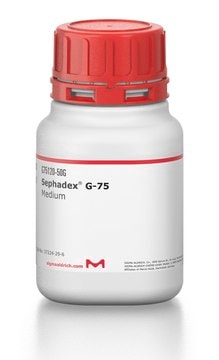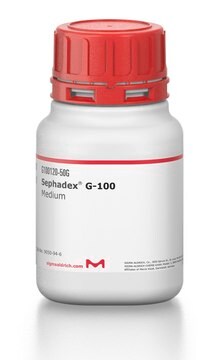Recommended Products
biological source
bovine
Quality Level
form
powder
technique(s)
tissue culture: suitable
storage temp.
−20°C
Application
Brain acetone powder bovine may be used in studies tissue-specific genes leading to the expression of proteins important for the analysis of immunoreactivity, disease pathogenesis and drug targeting.
Has been used as a crude source of calmodulin.
Storage Class Code
11 - Combustible Solids
WGK
WGK 3
Flash Point(F)
Not applicable
Flash Point(C)
Not applicable
Personal Protective Equipment
dust mask type N95 (US), Eyeshields, Gloves
Certificates of Analysis (COA)
Search for Certificates of Analysis (COA) by entering the products Lot/Batch Number. Lot and Batch Numbers can be found on a product’s label following the words ‘Lot’ or ‘Batch’.
Already Own This Product?
Find documentation for the products that you have recently purchased in the Document Library.
Affinity chromatographic isolation of calmodulin from bovine-brain acetone powder.
C R Caldwell et al.
Analytical biochemistry, 116(2), 325-330 (1981-09-15)
W M Pardridge et al.
Molecular and cellular neurosciences, 1(1), 20-28 (1990-08-01)
Tissue-specific gene expression within the brain capillary endothelium, which makes up the blood-brain barrier (BBB) in vivo, may lead to the production of brain capillary-specific proteins (BSPs). BSPs were defined in the present study by immunocytochemistry and Western blotting using
T B Ng
The International journal of biochemistry, 24(4), 653-656 (1992-04-01)
1. Bovine cerebral hemispheres were extracted with an acidic medium (acetone-water-hydrochloric acid mixture, 40:5:1 by volume, pH 1.8). The precipitate which formed upon addition of a copious volume of cold acetone to the extract was designated acid acetone powder (AAP).
Eric V Shusta et al.
Molecular & cellular proteomics : MCP, 1(1), 75-82 (2002-07-04)
The cloning of genes expressing proteins that are differentially expressed in the organ microvasculature has the potential to address a variety of problems ranging from the analysis of disease pathogenesis to drug targeting for particular tissues. This study describes a
Our team of scientists has experience in all areas of research including Life Science, Material Science, Chemical Synthesis, Chromatography, Analytical and many others.
Contact Technical Service








